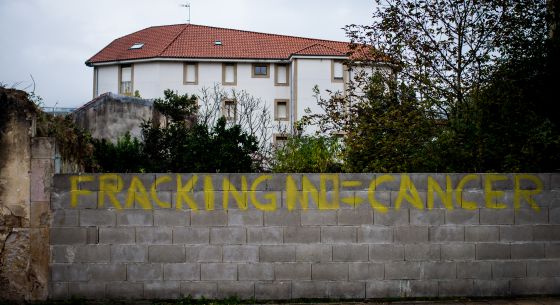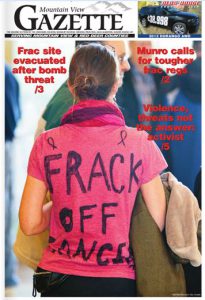Cantabria becomes first region in Spain to ban fracking, PP premier submits bill to prohibit controversial gas-extraction technique by Lola Hierro, January 30, 3013, El Pais
“Those scavengers are bleeding the Earth.” That is how Manuel López describes his battle against energy companies involved in fracking in Cantabria. … López, an environmental technician from Santander, has joined forces with Daniel González, a public works engineer who lives in the Cabuérniga valley, and Ángel Saiz, the mayor of the town of Villacarriedo, to stop fracking in their northern region, as well as throughout Spain. Their campaign has pushed the Cantabria regional parliament to begin debating a bill to make this practice illegal, even though the technique has the endorsement of the Industry Ministry.
Since 2011, six shale gas exploratory permits have been granted in the small mountainous region: five by the Industry Ministry and one by the former regional government of Miguel Ángel Revilla. In the rest of Spain, the ministry has given permission to 22 companies to explore for gas by fracking in some 400,000 hectares of land, with most of the operations now taking place in the Ebro river basin. … After months of protests in the region, the Cantabria government of Ignacio Diego, of the Popular Party (PP), last December drafted a bill to prohibit fracking. If passed in two to three months — as the regional government expects — Cantabria will become the first region in Spain to ban the method. … The Cantabria government stands to lose around 100 million euros in investment funds if the local bill is passed. “No one is going to make an investment if there are no guarantees that they cannot make a profit,” said Margarita Hernández, secretary general for the Spanish Association of Research, Exploration, Energy Production and Subterranean Storage Companies (Aciep). What we want to say with this new law is that exploration can take place but not fracking,” explained Cantabria’s environmental commissioner Javier Fernández, who adds that regions have the legal right to introduce their own environmental regulations. But Aciep maintains that shale gas can only be obtained through this technique.
The Anti-Fracking Association is suspicious about the future. “It should be banned in all of Spain because water doesn’t recognize borders; if one aquifer is contaminated, they will all be contaminated,” said González.
But the Cantabria government isn’t trying to “export” its anti-fracking law to other regions. “It is more important for us as an environmental issue rather than an energy issue but we respect other people’s decisions,” said Fernández. In Cantabria, the permits that have been issued affect a third of the region. “Myself and other mayors didn’t know anything about this until we were called by the [regional] parliament,” explained Mayor Saiz. The anti-fracking campaign has so far been successful. After one year of educating people about the dangers, many residents of Cantabria now know the risks involved. This is evident by the number of signs and graffiti that have appeared: “fracking =cancer” or “fracking=Cantabria finita.” Some 30 municipalities have already approved petitions against the energy companies, and on October 6, more than 2,000 people demonstrated in Santander.
Mayor Saiz explains that the region’s food supply is even more at risk because 80 percent of the economy relies on cattle ranching. “If the water is contaminated, we will suffer irreversible damage; the wells, the noise from the trucks will shatter our peaceful environment,” the mayor said. “If the trucks come, I will be the first one to throw myself on the highway to stop them,” said Mayor Saiz. [Emphasis added]

Source: El Pais
[Refer also to: ERCB Frack Directive Feedback by Ronalie and Shawn Campbell, January 14, 2013. There is much “talk” that the practice of fracturing is safe. This directive clearly indicates that the writer knows this is not true, as there are many references to managing the risks.

